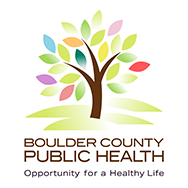Body art is an invasive procedure in which the skin is punctured or compromised. Contaminants or pathogens can invade the body through puncture wounds.
Reduce Your Risk for Health Complications
Body art is an invasive procedure in which the skin is punctured or compromised. Contaminants or pathogens can invade the body through puncture wounds. Poor sanitation practices can lead to infection or transmission of communicable diseases, such as hepatitis B and hepatitis C.
Boulder County Public Health (BCPH) inspects and licenses body art facilities. BCPH Body Art Facility Inspection Records Search is available for the public to review.
Ask to See their License
All body art facilities operating in Boulder County are required to be licensed by Boulder County Public Health (BCPH) and to have their license on display. Also, all operators are required to have blood-borne pathogen training. Ask to see their certificates.
Every Facility Should Be Recording Spore Information
Most body art facilities use an autoclave to sterilize instruments. The only way to determine if the autoclave is operational is to perform a spore test, which is sent to a third-party laboratory for analysis. Boulder County Public Health requires these tests to be done at least monthly, and the results to be on-site.
All Instruments Used in a Procedure Must be Sterilized
A peel pack is a bag that is clear plastic on one side and stiff paper on the other. A color change strip on or in the peel pack can indicate whether the instrument inside was sterilized at the proper time and temperature.
Any Machines Used in the Procedure that cannot be Sterilized Must Be cleaned and Disinfected
Tattoo machines and ear piercing guns do not come in contact with the skin, but they must be cleaned and disinfected before and after each use.
Proper Disinfectants Must Be Used
The label of a disinfectant will tell you what it can destroy. A disinfectant used in a body art facility must be capable of destroying hepatitis B.
The Operator Should Demonstrate Clean Technique
This involves the operator washing their hands, wearing gloves, not touching dirty surfaces during the procedure, ensuring sterilized instruments are not compromised. When handling a sterilized instrument, an operator that touches a dirty surface must remove their gloves, wash their hands, and put on new gloves.
Review Past Inspections When Considering a Facility
BCPH publishes recent sanitation inspection records. Even with a perfect record at the time of inspections, body art should be considered a procedure that involves some risk. By selecting a facility with a strong track record, you may be reducing, though not eliminating, that risk.
Facility and Artist Safety
Poor sanitation practices, such as the improper sterilization of instruments, can lead to infections or the transmission of communicable diseases, including hepatitis B and C. By asking questions and observing how a facility operates, you can help reduce your risk of complications arising from body art procedures.
Safety Considerations
Boulder County Public Health (BCPH) licenses and routinely inspects all body art facilities operating within the county. “Body art” facilities include any that provide tattoo, piercing, or permanent makeup services.
BCPH strongly recommends that people not receive tattoos, body piercings, or permanent makeup services from any person or business that is not licensed and inspected. Ask if a business is licensed, and be skeptical of advertising for body art from people who can travel to your house, or who offer to have you come to their house. Find out if the business is licensed by checking our list of Body Art Facility Inspection Records Search in Boulder County.



